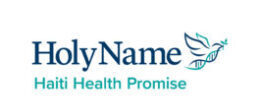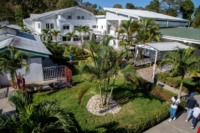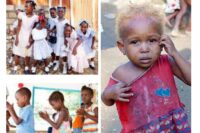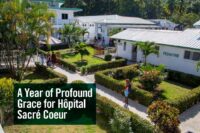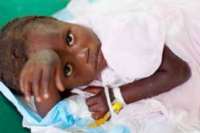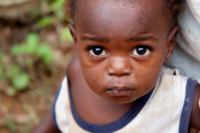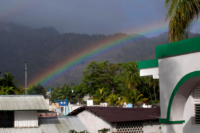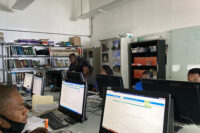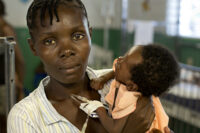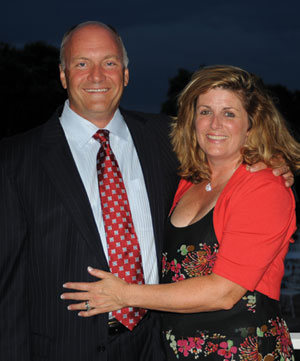 Do you recall where you were on January 12, 2010?
Do you recall where you were on January 12, 2010?
Very often, we define critical or tragic events during the course of our lives by our recollection of where we were when those events happened. President Kennedy’s assassination, the first Apollo flight, September 11th. Even the ones that occurred when I was very young left an indelible image of where I was and who I was with.
Sadly, I have no similar memory of the day a 7.0 magnitude earthquake ravished Haiti.
Friends and colleagues like Dr. David Butler, Dr. Chris Englert and Dr. Tim Finley had been volunteering their time and skills to the people of Milot for many years.
I was supportive of their efforts but disengaged; distant in my comprehension of what they were really doing and the impact they were making. That all changed when Drs. Finley, Gwertzman and Butler provided testimonials to the staff at Holy Name Medical Center after their grueling and often frustrating experiences caring for patients after the earthquake. The doctors’ pain was real, their emotions straight from the heart, as they relayed their triumphs and failures–failures due to the absence of basic commodities we take for granted every day; namely, oxygen.
Determined to solve this singular problem, they researched and connected with OGSI, a manufacturer of oxygen generators in upstate New York. Upon hearing of the Haitians’ plight and our physicians’ wishes, the company agreed to sell the equipment at cost. The Holy Name family, medical staff and employees launched a small campaign to raise funds for the generator, the hospital paid the balance and the machine was purchased.
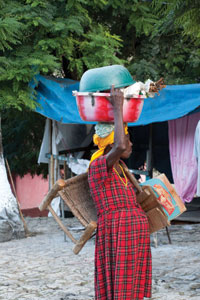 My first trip to Haiti was later that year, to begin installation of the equipment. I remember vividly the first text message I sent home as our truck maneuvered the crater-strewn roads of Cap Haïtien: “This place gives a whole new meaning to the word poor.” It was a brief trip, but its intensity hooked me, and I began to fully realize the powerful forces, both positive and negative, that exist in Haiti.
My first trip to Haiti was later that year, to begin installation of the equipment. I remember vividly the first text message I sent home as our truck maneuvered the crater-strewn roads of Cap Haïtien: “This place gives a whole new meaning to the word poor.” It was a brief trip, but its intensity hooked me, and I began to fully realize the powerful forces, both positive and negative, that exist in Haiti.
We arrived at our destination, only to find that the components of the oxygen generator were scattered about the property in large crates, exposed to the weather but intact. A small building to house the apparatus needed to be constructed and trenches for pipes that would transport the oxygen across the street to the hospital had to be dug. But first, the crates would have to be moved–crates that weighed 2,500 pounds and more–but there were no forklifts or power tools.
It was then, when I had no idea how we would accomplish anything without the proper hardware, that I learned my first lesson in positivity: We’ll do it the Haitian way!
Haitian wisdom asserts that no task is too large, obstacles can be overcome, and no impediment is insurmountable. When it came time to move the first crate, 20 Haitians surrounded the container and manually lifted it. As the crate teetered, I looked on in horror, fearing they would drop it and someone would be seriously injured. Through my translator, I pleaded with one wiry elderly man wearing flimsy sandals to step back, as the crate suddenly jolted to one side. He smiled at me, laughed and said, “Better that I lose my foot doing something useful than keep it and sit idle by the side of the road.” And with that, he kicked off the sandals and resumed his position at the crate, barefoot. Several hours later, all the crates had been moved and covered in preparation for the generator’s installation.
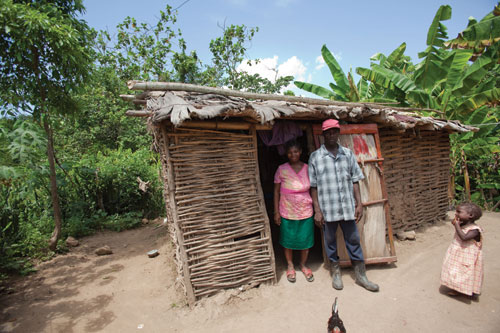 At the end of each day, Drs. Finley and Gwertzman and I would take our day laborers across the street to a small local establishment known as Bon Bons. We hoped for a nice cold Prestige beer to wash away the dust and sweat, but the rigors of Haitian deliveries denied us and we settled for ice cold Coca-Colas. Nevertheless, we relaxed and engaged our Haitian friends, learning of their desires and dreams, their pain and suffering.
At the end of each day, Drs. Finley and Gwertzman and I would take our day laborers across the street to a small local establishment known as Bon Bons. We hoped for a nice cold Prestige beer to wash away the dust and sweat, but the rigors of Haitian deliveries denied us and we settled for ice cold Coca-Colas. Nevertheless, we relaxed and engaged our Haitian friends, learning of their desires and dreams, their pain and suffering.
One evening after completing our ritual and returning to the CRUDEM compound, a surgeon from Nebraska came to me. He said, “Every day I see you guys buy the Haitians cokes and sit and laugh and talk. Why do you do that?” He went on to explain that he had been coming here for several years, but never really engaged the locals. He’d walk from the housing compound to the hospital, operate, see his post-op patients and return to the compound. He felt good about his contribution to the community, he saved lives, but he also realized he was missing out on much more of the Haitian experience. He never really got to know and understand the people themselves; they were patients, one more case on a very busy schedule. As we talked about it, we realized that while many volunteers come and provide valuable medical and surgical care, they never pause to discover the people on a personal level, to appreciate their challenges and struggles, and even more so, to witness their hope, joy and determination to make a better life.
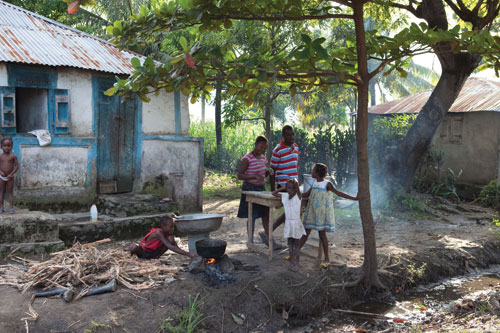 During this same trip, a veteran volunteer was astute enough to perceive my growing enthusiasm as we progressed with our oxygen generator project. He cautioned me against getting overzealous and raising my expectations. After all, this was still Haiti. He explained how he, too, once had the drive to make a difference; the mere fact that he was there now, was testimony to the fire still burning within him to exert a real effect on the Haitian people. However, years of frustration and disappointment dulled the fervent energy that once empowered him. The high demand for tolerance and patience, and submitting to the reality that there is only so much one can do in a short period of time in such unfavorable conditions, had taken their toll. Be grateful for the small successes, he advised me. Don’t lay blame, should you feel you are taking two steps forward and one step back. After all, this is Haiti. We can’t change it; all we can do is work toward modest victories. There aren’t enough resources, time and energy, he counseled, to ever make a significant difference.
During this same trip, a veteran volunteer was astute enough to perceive my growing enthusiasm as we progressed with our oxygen generator project. He cautioned me against getting overzealous and raising my expectations. After all, this was still Haiti. He explained how he, too, once had the drive to make a difference; the mere fact that he was there now, was testimony to the fire still burning within him to exert a real effect on the Haitian people. However, years of frustration and disappointment dulled the fervent energy that once empowered him. The high demand for tolerance and patience, and submitting to the reality that there is only so much one can do in a short period of time in such unfavorable conditions, had taken their toll. Be grateful for the small successes, he advised me. Don’t lay blame, should you feel you are taking two steps forward and one step back. After all, this is Haiti. We can’t change it; all we can do is work toward modest victories. There aren’t enough resources, time and energy, he counseled, to ever make a significant difference.
Since that very first trip, I have been fortunate to return to Milot several times. By December of 2012, I will have visited four times this year alone. By no means am I a seasoned or hardened volunteer. As a late-stage neophyte, my enthusiasm and optimism that we can make a difference has not faded, it’s been reinforced. I understand why so many come so far to volunteer, even in the face of what appear to be insurmountable odds. And I see that same motivation and drive in the Haitian people. So far, I have not subscribed to the commonly accepted wisdom; After all, it’s Haiti. There’s only so much you can do. Yes, the challenges are great, the environment unforgiving. But our added value to the community of Milot goes way beyond the surgeon’s time in the OR. We can bring a discipline, a plan and resources to enact efficient and sustainable change relatively quickly.
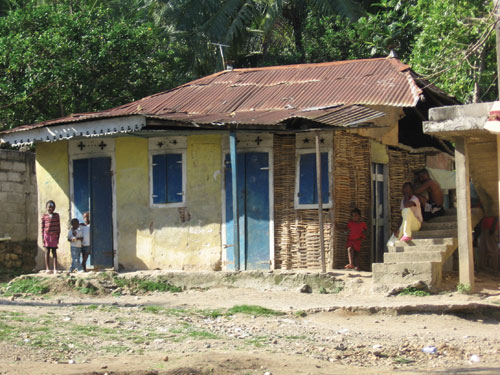 I am often asked (and sometimes criticized) about why I would spend so much time and resources in Haiti, when there are many needs and problems right here at home. My standard answer: We in the USA have become accustomed to debating and defining ourselves at the extremes. We ignore or tune out the moderation that dwells in the middle of the bell curve. Nowhere in our nation have I ever experienced the extremes—both bad and good—that I’ve known in Haiti. To realize that the negative forces of poverty, corruption and paucity are counterbalanced by the positive forces of hope, inspiration, love and an unwavering conviction and desire to move forward is at once, both overwhelming and invigorating.
I am often asked (and sometimes criticized) about why I would spend so much time and resources in Haiti, when there are many needs and problems right here at home. My standard answer: We in the USA have become accustomed to debating and defining ourselves at the extremes. We ignore or tune out the moderation that dwells in the middle of the bell curve. Nowhere in our nation have I ever experienced the extremes—both bad and good—that I’ve known in Haiti. To realize that the negative forces of poverty, corruption and paucity are counterbalanced by the positive forces of hope, inspiration, love and an unwavering conviction and desire to move forward is at once, both overwhelming and invigorating.
In the end, Holy Name’s involvement with Haiti makes us better. Those teams that spend a week in Milot return bonded, having formed enduring relationships. They gain a renewed sense of appreciation for the resources we take for granted. Our caregivers develop a deeper commitment to their ministry, recalling why they entered the healthcare profession in the first place. I’ve seen my staff revitalized; inspired by the sort of insight obtained during a profound experience of the kind they’ve had in Milot. That experience costs. It’s inconvenient, it’s uncomfortable, it’s complicated. . . and it only improves the care we provide in our community.
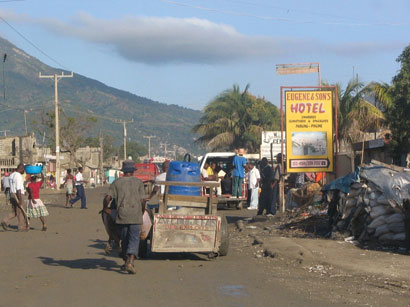 But the most important driver is what we can do for the people of Haiti. Should we choose to suppress our own vanity and egotism, and substitute a humble and modest servant leader disposition, opening ourselves to possibility in accordance with Matthew 25:40-What you do unto the least of my brothers and sisters you do unto me–then the rewards will be bountiful, both in Haiti and at home.
But the most important driver is what we can do for the people of Haiti. Should we choose to suppress our own vanity and egotism, and substitute a humble and modest servant leader disposition, opening ourselves to possibility in accordance with Matthew 25:40-What you do unto the least of my brothers and sisters you do unto me–then the rewards will be bountiful, both in Haiti and at home.
